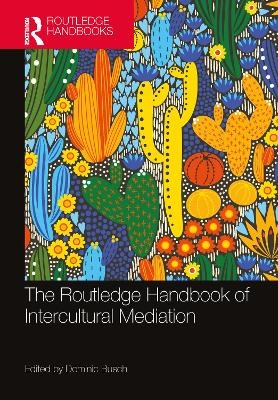
The Routledge Handbook of Intercultural Mediation
Routledge (Verlag)
978-1-032-12974-7 (ISBN)
Authored by global experts in fields from intercultural communication and conflict resolution to translation studies, literature, political science, and foreign language teaching, chapters trace the history, development, and present state of approaches to intercultural mediation. The sections in this volume show how the concept of intercultural mediation has been constructed among different fields and shaped by its specific applications in an open cycle of influence. The book parses different philosophical conceptions as well as pragmatic approaches, providing ample grounding in the key perspectives on this growing field of discourse.
The Routledge Handbook of Intercultural Mediation is a valuable reference for graduate and postgraduate students studying mediation, conflict resolution, intercultural communication, translation, and psychology, as well as for practitioners and researchers in those fields and beyond.
Dominic Busch is a full professor of intercultural communication and conflict research at the faculty of human sciences, University of the Bundeswehr Munich, Germany.
PART I: Professional intercultural dispute mediation Chapter 1. Culture and mediation: A 2020s perspective on early criticism of Western paradigms Chapter 2. Cross-cultural disputes and mediator strategies Chapter 3. De-essentializing notions of self and identity in mediation Chapter 4. Cultural humility in intercultural mediation Chapter 5. Intercultural mediation training Chapter 6. Interculturality in Online Dispute Resolution (ODR) Chapter 7. Policing and intercultural mediation: Forms of triadic conflict management Chapter 8. Putting culture into a perspective in intercultural mediation PART II: Intercultural mediation in international politics Chapter 9. Interculturality in the concept of peace mediation Chapter 10. Hybrid peace mediation in the age of pandemics Chapter 11. The political dimensions of culture and religion in mediation Chapter 12. Third parties’ involvement in contexts of political conflict and power imbalances Chapter 13. Seeing people in interactive peacemaking through a consciousness lens Chapter 14. The past is the past—or is it? Considering the role of the past in intercultural mediation Chapter 15. The politics of intercultural space: Inclusive, unobtrusive, and failed mediation PART III: De-Centering Alternative Dispute Resolution (ADR) Chapter 16. Imagining a racially diverse and inclusive mediation field: Uncovering the structural hurdles Chapter 17. Intercultural mediation from a European perspective Chapter 18. Islamic forms of intercultural mediation Chapter 19. Transforming conflict cultures through mediation Chapter 20. Indigenous conflict resolution strategies beyond the ADR paradigm PART IV: De-essentializing culture in intercultural mediation Chapter 21. The discourse of thirdness in intercultural mediation Chapter 22. The triadic character of intercultural learning: Insights from edusemiotics Chapter 23. The bridge metaphor in intercultural mediation Chapter 24. Using creative non-fiction to pinpoint moments of deCentering in intercultural mediation Chapter 25. Emic and etic perspectives on culture in mediation Chapter 26. Professional dispute mediators’ notions of culture Chapter 27. Design thinking and design communication for intercultural conflict management PART V: Theorizing intercultural mediation Chapter 28. Theorizing mediation from the perspective of legal anthropology Chapter 29. Anthropological approaches to culture in conflict mediation Chapter 30. Anthropology and mediation in an environmental conflict: Worldview translation as synthesis Chapter 31. Weaving together three strands of research: Culture, communication, and conflict Chapter 32. Intercultural mediation as intercultural competence Chapter 33. It takes three to tango. A sociological triadology Chapter 34. A framework for understanding intercultural mediation from the standpoint of a systemic theory of communication PART VI: Linguistic explorations of intercultural mediation Chapter 35. Research from conversation analysis on intercultural mediation Chapter 36. Managing culturality in mediation sessions: Insights from membership categorization analysis and discursive psychology Chapter 37. Intercultural mediation from the perspective of linguistic pragmatics Chapter 38. Storytelling, culture, and identity in mediation PART VII: Psychological tools for analyzing intercultural mediation Chapter 39. Cultural intelligence in intercultural mediation Chapter 40. Research from psychology on intercultural mediation: Cultural values and emotional intelligence Chapter 41. Measuring intercultural mediation in the context of intergroup conflict: Classical and modern test theory approaches to scale assessment PART VIII: Translation research and intercultural mediation Chapter 42. Intercultural mediation in translation and interpreting studies Chapter 43. Translation as intercultural mediation—The evolution of a paradigm Chapter 44. The mediating role of empathy in community interpreting Chapter 45. Exacerbating cultural differences in translation/interpreting as intercultural mediation PART IX: Intercultural mediation in foreign language education and the arts Chapter 46. The intercultural speaker as an intercultural mediator Chapter 47. Intercultural mediation in contexts of translanguaging Chapter 48. Children as intercultural mediators Chapter 49. Intercultural mediation in the world language classroom
| Erscheinungsdatum | 27.10.2022 |
|---|---|
| Reihe/Serie | Routledge Handbooks in Communication Studies |
| Zusatzinfo | 12 Tables, black and white; 18 Line drawings, black and white; 2 Halftones, black and white; 20 Illustrations, black and white |
| Verlagsort | London |
| Sprache | englisch |
| Maße | 178 x 254 mm |
| Gewicht | 453 g |
| Themenwelt | Geisteswissenschaften ► Psychologie ► Allgemeine Psychologie |
| Geisteswissenschaften ► Psychologie ► Sozialpsychologie | |
| Sozialwissenschaften ► Kommunikation / Medien ► Kommunikationswissenschaft | |
| Sozialwissenschaften ► Politik / Verwaltung ► Europäische / Internationale Politik | |
| ISBN-10 | 1-032-12974-3 / 1032129743 |
| ISBN-13 | 978-1-032-12974-7 / 9781032129747 |
| Zustand | Neuware |
| Informationen gemäß Produktsicherheitsverordnung (GPSR) | |
| Haben Sie eine Frage zum Produkt? |
aus dem Bereich


